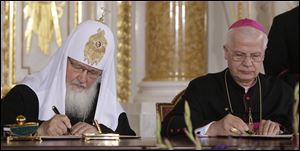
Leaders of Russian, Polish churches sign mutual-forgiveness document
8/18/2012
Patriarch Kirill, left, of the Russian Orthodox Church, and Archbishop Jozef Michalik sign the agreement in Warsaw.
WARSAW -- The leaders of Russia's Orthodox church and Poland's Catholic church signed a document Friday that urges their nations to forgive each other for past wrongs.
The signing during the first visit to Poland by a Russia patriarch has been described by the churches as a historic act of reconciliation and the establishment of a bridge between the denominations.
The two nations have feuded for centuries, and their ties are still marked by distrust.
"We appeal to our believers to ask for the forgiveness of wrongs, injustice, and every evil committed against each other," the document says. "We are certain that this is the first and the most important step toward rebuilding mutual trust, which is a necessary element of a lasting community and full reconciliation between people."
The document was signed during a ceremony at Warsaw's Royal Castle by Russian Orthodox Patriarch Kirill and Archbishop Jozef Michalik, the Polish church's highest-ranking leader.
The document mentions the "open enmity, even fighting between our nations" in the past and calls for a "brotherly dialogue" in all walks of life.
Church leaders said it is not another political declaration, but a religion-motivated call to the hearts and minds of ordinary people in both nations.
Some have compared the document to a historic 1965 letter by Poland's bishops to the Catholic church leaders in Germany, offering and asking forgiveness for past wrongs between Poles and Germans, the most painful committed during World War II.
Today Poland and Germany have friendly relations and are cooperating within the European Union.
The many sources of bitterness between Poles and Russians include Polish resentment over Moscow's control of Poland during the communist era and Russia's reaction to Poland's joining Western institutions such as NATO.
Elderly Poles still talk bitterly about Moscow's "stab in the back" -- the attack from the East by the Soviet Red Army on Sept. 17, 1939, less than three weeks after German troops invaded Poland from the West, starting World War II.
They point to the killing of more than 20,000 of their officers by Soviet secret police in 1940 in the Katyn forest and other sites.